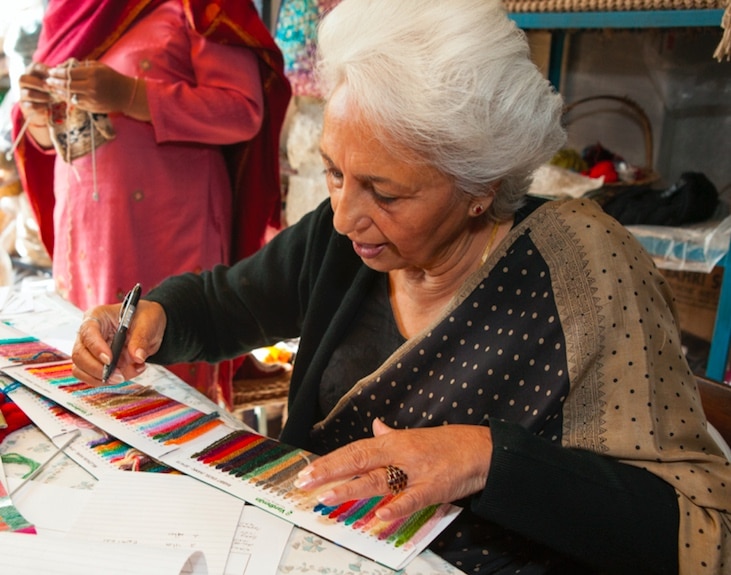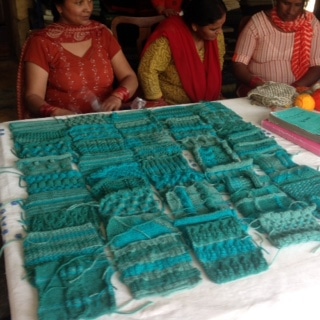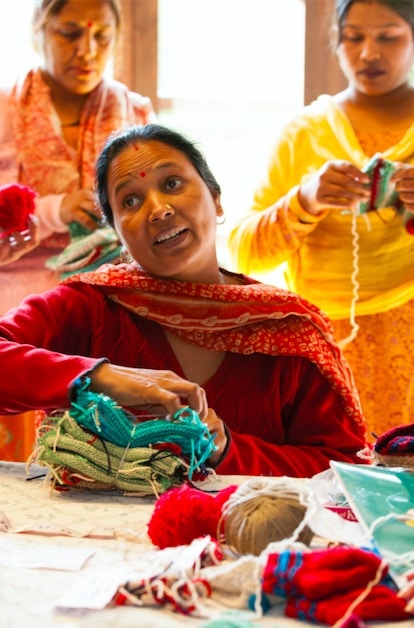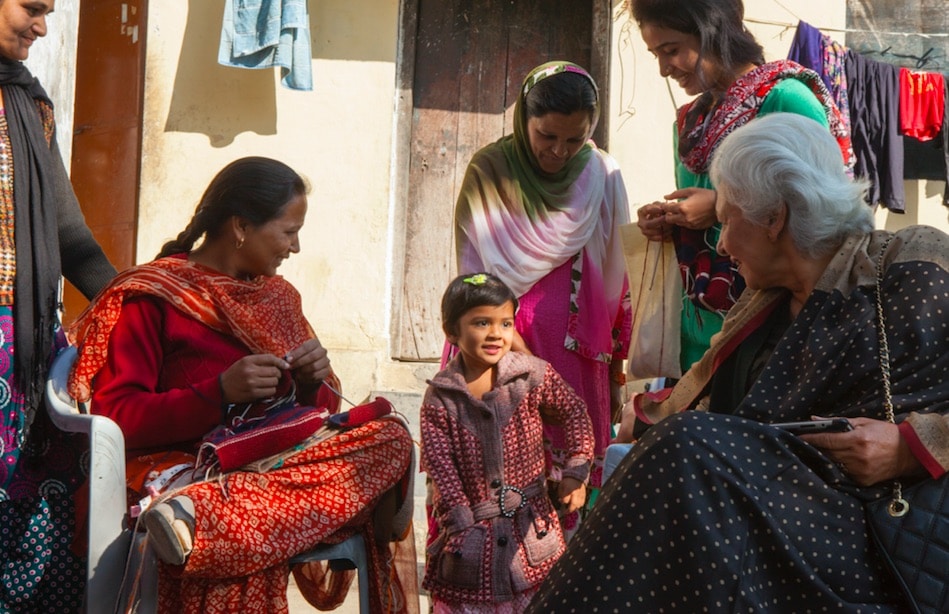
Shubh Chopra
Social Enterprise for a Tight-Knit Community
BY PAKSY PLACKIS-CHENG
Shubh Chopra knitted a blanket for her son in London. She laughed when he encouraged her to sell her knitted blankets. Now, 15 years later, Chopra teaches and supports a strong community of women at the foothills of the Himalayan Mountains. From there, her Chandroti’s knitwear is coveted globally. Shubh Chopra shows us that it is never too late to start a social enterprise.
You have given women knitters and their families a livelihood.
Thank you. You know something; it has been a joy. All my kids have flown away, are living in their own worlds, and have lovely babies. Chandroti has given me a motive to live, to jump out of bed. Maybe I’m the bigger beneficiary! [Laughs.]
Tell me about your women knitters?
There are about 160 women right now. This is in addition to their housework; most of them have a cow. So they don’t have too much time to knit. They work maybe two hours a day, so items take very long to make. Then, if they have a problem in the house, they get sick, their child gets sick, or their cow get sick, they can’t come to work.
I have a lovely studio. They learn the pattern from me. I give them the yarn. They keep coming back to show me that they are progressing. Then they finish it at home and bring it back. They work at their leisure.
I understand some women are from villages far away?
Yes, about four women live 100 kilometers from my house. I said, “What are you doing? It’s going to cost you too much to come.” So they made friends with the bus driver. They would finish one piece, and the bus driver would drop it in a bag at the police station. My husband and I would go and pick it up. So it didn’t cost anybody.

Chandroti throw made of patches by women knitters in various villages
A buyer in Australia, Jac and Jack, bought items until two years ago. They kept writing me lovely letters saying, “We miss you. We wish we could work with you again.” They said that they’ve never seen work so well knitted. I’m very particular about quality. They expanded so much that I could not keep up with the demands. If you are taking twelve blankets, that is a big order for us.
A company gave our work as gifts in New York. They took 200 pieces and gave me only four months to work. We had more than 200 women working! I had to go out in the villages and find more women knitters.
The business has stayed the same even without the large orders. It’s word of mouth. A friend talks to a friend, a relative visits, and they buy a blanket. So it’s like that.
My children want me to sell online. I don’t know how to do it. I’ve just got to the point of being able to send you an email and downloading things. [Laughs.] I’m a grandmother; I like to be able to travel to my grandchildren’s birthdays. This suits me.
Is selling online something you want? It seems you have set up Chandroti beautifully the way it is.
I’m really happy. Even though, things have become a little more expensive than they were 14 years ago. If I get an order and the ladies can’t come, it is difficult. It’s not a factory.
Fab India is a very well known shop here. They’ve got 400 outlets all over the world. India, London, I believe in America also. They approached me, but they said, “You have to cut down your rates.” I said, “Well, why would I want to do that for?”
The knitters are very poor. They only recently got cell phones and they can barely call me because of the cost.
Give me an example of one of the knitters that have been with you for a long time.
When our children were all settled, we decided to build a house and live here. It’s in the middle of the forest and there’s a river down below.
I said, “Would anybody like to learn to knit?” One lady came and she’s still with me. She’s one of my head workers; she’s so well trained now. Her name is Anita Verma.
My sister was coming back from the States and I said, “Okay, lets make my sister a blanket.” That’s the first blanket I made. With Anita’s help, we put it together. I didn’t even know how much to pay her.
We didn’t talk about money. In the end, I just give her a 500 rupee note. This is 14, 15 years ago. She was so happy. The next day when she came she brought a woman. In three months I had 45 women from around the village. Today, I have knitters from villages very far away. They spend around 80 rupees [approx. $1] to come here and get back home, which is a lot of money for them.
I created items worthwhile for them to come. Full-size blankets take them about a month, month and a half, to make one. That makes them happy. One of them said, “Please give me a blanket to knit; I need to buy medication.” They are very poor but very joyful people. I’ve learned a lot from them.

Chandroti knitters
What is something that you’ve learned from them?
Once, I was paying a lady that really knitted well. She got more money than the others. I looked at her and said, “Well done! Go and buy something nice for yourself. Something you always wanted.”
That’s how I thought. “Tell your husband that it is your money. [Laughs.] Go buy jewelry or a bag.”
She smiles at me and says, “You know when you spend on your own family, it’s like spending on yourself.” I sat there and I said, “My God, what a shallow person I am.” The joy it gives you if you spend on your husband and your children. I said, “Yeah, that’s true.” But all my life my money had gone to my shoes or bags, ‘till then.
They are a very happy lot. When they come, they all dress up, because my place has become like a club. They all wear their Sunday best, there are times they are better dressed. I’m the shabbiest sometimes! [Laughs.] This has made me alive.
In general, what do you think is needed for social impact?
It was basically providing them with a little money. It is not that they are running their homes only on this. This has given dignity to these women. I asked them once, “Do your husbands resent that you are doing this?” They said, “No ma’am.” You see, when they take the yarn, the husbands make the balls from the yarn. They are part of it. The children are part of it.
The children come along to my house. While the mother is knitting, the children are playing. One of the ladies has a boy who went to an English school and then started working in a hotel. They sent him to Dubai for a year. Can you imagine? That was not possible. One mother bought a motorbike.
They return the knitted pieces slowly. One lady just came by last week. And, she says ma’am, I’m putting my slab in. She took 10,000 rupees at once [$149.43]. I can’t tell you the joy it is, and now I just miss her.
You won’t believe they come to check on me, and they’re crying [three men broke in the house over the weekend]. I said, “Why are you crying? I’m still alive!” I continued, “Nothing is gone, nothing has happened, don’t worry.”
We always ask our interviewees who has left an imprint on their professional DNA.
My younger son was living in London. I made these blankets. When I saw the blankets coming out nicely, I made them for my two other children who have their own kids. My younger son had been married only two or three years, and they didn’t have a baby. I thought, “Why shouldn’t their home have a blanket from me?”
With the ladies knitters, I made a blanket for him. I sent it to him in London. When he came for a break here, he casually mentioned, “Mom, all our visitors to the apartment love the blanket that you sent me.”
So I promptly said, “Should I send you another?” He said, “Good heavens, we have one-bedroom! But why don’t you do this and sell it?” I told him, “Are you crazy? I knit out of love, I don’t want to knit for the world.”
He said, “You have a village here, you have a village there, why don’t you work together and give some people relief?”

Chandroti knitters and child.
When we moved here, there was not even a local bus coming to the village. When my husband and I used to go and drive into town, we used to give whoever was walking a ride. Everybody walked to the nearest point. I said, “Do you think I can start this business?” He encouraged me.
And why not? I thought about it for two months. One day, I said, “Let’s see.” I took off and never looked back.
That one remark of my son. I always tell him, “You started me on this.” I had no ideas. I’m not a designer. I am an ordinary housewife. I thought, “Okay, let’s make these little batches.” There were 45 women, so the design had 45 pieces. Everybody made a patch. A product had emerged. Today we are making almost 20 items: footsies, caps, beanies, and hot water bottle covers.
It was made piece by piece. I put seven colors in it: I can’t remember for the life of me what they were. From lilac to purple, it was very beautiful. You know what happens, the colors go off the market. Every year something new comes in.
What would you say to young entrepreneurs or people pursuing social enterprise?
If you start something, stick to it. It took me almost two and a half years before I could sell even one item. It’s difficult to make people open their wallets and pay for something. They have to love it, and you can’t do it by making people feel sorry for you.
The ladies are amazing. I want to do a pattern, and I teach them. I have to open the book. They are illiterate. I ask, “Okay, do you remember?” We have 50 pages for a pattern.They’re doing it all from by heart. The pieces have gone everywhere: Rome, Shanghai, Jakarta, New York, and Sydney. We just sent a shipment to Hong Kong.
Give me one word that describes your journey so far.
Bliss. I’m so happy. Everybody has serious problems. We had this terrible break-in by three intruders on Saturday evening. I’ve been inundated with the police officers. But when the ladies came this morning to work, I sat with them, and the calmness came. They’re family to me now…15 years. Bliss, I can’t think of another word that could accurately describe it.



